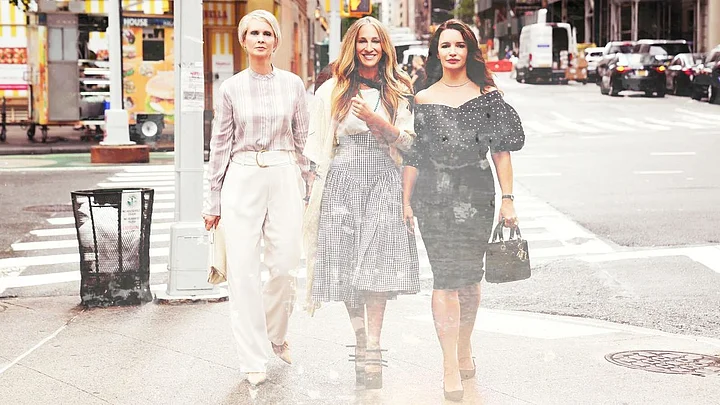And just like that, the dominant feeling is that of a quickly growing embarrassment. Carrie has gone from keeping her sweaters in the oven to talking about the quality of salmon, avoiding talking as much as possible about sex even if she wanted to participate at all costs in a podcast about sexuality in the days of non-binary and woke culture.
Miranda quit her job as a corporate lawyer “after the Muslim ban” and is now studying to become a civil rights champion, not realizing the limits of her privilege. Charlotte confirms herself as the worst written character, a typical Momzilla who doesn't even try to deal with the world out of her Upper East Side flat. She is devasted by botox and lip-pumping stuff, Carrie has more extensions than thoughts, Miranda is a usual radical chic, so she keeps her hair grey and her fights worth. Samantha is gone, and maybe that was the best choice to be made. There's no sex anymore in the city, and almost no life left.
All the 'Right' Issues
With Samantha and with sex, comedy also seems to have almost completely disappeared. Occasionally, in the quick dialogues, the humour of yesterday peeks out, even if the rhythm, especially in the exchanges between the protagonists, seems to need a little more training to compensate for Samantha's absence. What was supposed to be in the original plans, a celebration of life over 50, of a new, mature and fruitful phase of female existence, reveals itself as a strenuous attempt to prove the four (now three) friends as still relevant after all these years in the times of a pandemic (prematurely labelled 'post-pandemic') and in the era of political correctness.
The revolutionary serial we all loved has changed into a catalogue of American-style political correctness and has totally lost its teeth, trying not to hurt the feelings and beliefs of New Yorkers; the rest of America does not give a damn and never did. The plot looks shabby, the story is simply not there.
What happens looks like being taken by a list of 'right' issues to deal with. Being an alcoholic, being the only white couple to a dinner of blacks or the other way round, dealing with a maybe-queer teenager daughter, dealing (again, shabbily) with the death of the love of your life, with your hips failing, with your career not being satisfying anymore, with your marriage falling apart. Nobody deals with her physical figure falling apart yet, but for this, we would have needed Samantha. There's nothing to make up for the lack of depth, content and, above all, the fun of the serial: not even clothes, since the legendary Patricia Field has long ago migrated to Emily in Paris to spread her magic there.
Everything Is Calculated
Old Manolos are only for nostalgics. The introduction of new characters, such as Che Diaz, a non-binary stand-up comedian played by Sara Ramirez, the black teacher played by Karen Pittman, or the Indian-origin Carrie's real estate agent (and ideally 'new Samantha'), is clearly a desperate attempt to make up for the less-inclusive past of the serial liberally sprinkling colour, ethnicities and different gender (or non-gender) orientations into the cast.
The old characters, too, have new dynamics, more or less successful: a stormy but close relationship between Stanford and Anthony (Ah, the old good Hallo, Chanello!) and poor Steve being treated like the old deaf uncle. But all this renewal effort, beyond a necessary adjustment to the current times (Carrie has a new Mac and a little more), almost seems to betray an underlying insecurity and a clear lack of direction.
Basically, the trio has nothing more to say. Carrie's voice has been erased, she does not even write anymore. Miranda cribs all the time about the now-teenager Brady having sex, Charlotte is just a parody of herself.
“We can't stay who we were,” Miranda says at one point. The problem is that the only reason why we have looked forward to seeing these protagonists on stage is because we have very well in mind who they were and what they represented for us, what the engine of change was, of liberation and also of the frank and free emotions that they put in place during those glorious years. Now, everything seems more calculated, polished, refined, and controlled.
We've All Been Carrie
We’ve all been Carrie at a point, with our money put “where I can control it, hanged in my closet”, a pile of shoes and a broken heart; dating the city when there was no one else to date, or being underpaid but writing stuff we loved.
Please, if you can, give us back the Carrie, Miranda and Charlotte of yesterday, matured from the joints of life but still with a sparkle. Those witty, politically incorrect but human friends. Give us back mistakes, failures, jokes, gossips (maybe not Cosmpolitans, I hate it). Give us back the boldness of (almost) youth – theirs and ours. I would not want those three ‘grown-up’ boring (and not that well dressed) ladies as friends to save my life, at the moment. And frankly, once the dutiful and cathartic tears for the way they (and we) were are dried, I can not help but ask myself: what’s the ultimate meaning of such an operation?
(Francesca Marino is a journalist and a South Asia expert who has written ‘Apocalypse Pakistan’ with B Natale. Her latest book is ‘Balochistan — Bruised, Battered and Bloodied’. She tweets @francescam63. This is an opinion piece and the views expressed are the author's own. The Quint neither endorses nor is responsible for his reported views.)
(At The Quint, we question everything. Play an active role in shaping our journalism by becoming a member today.)
